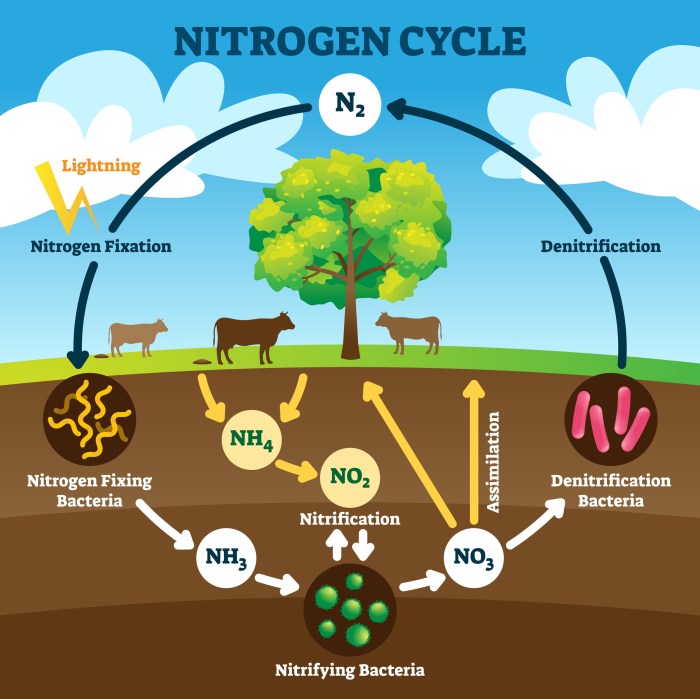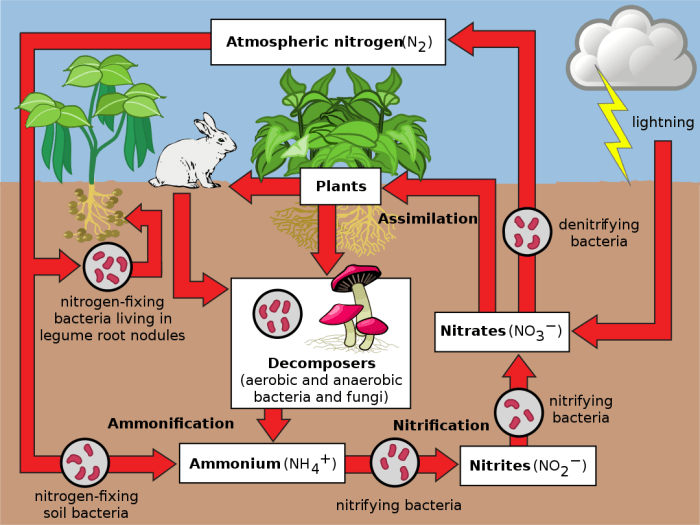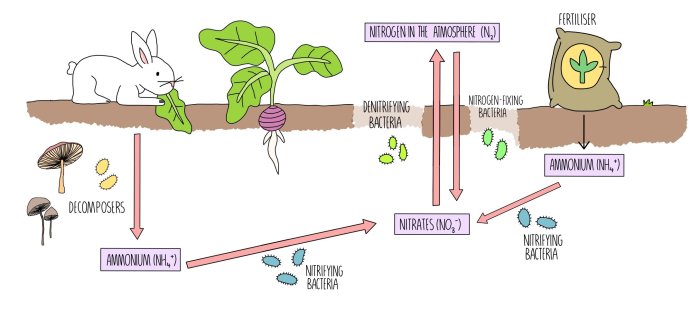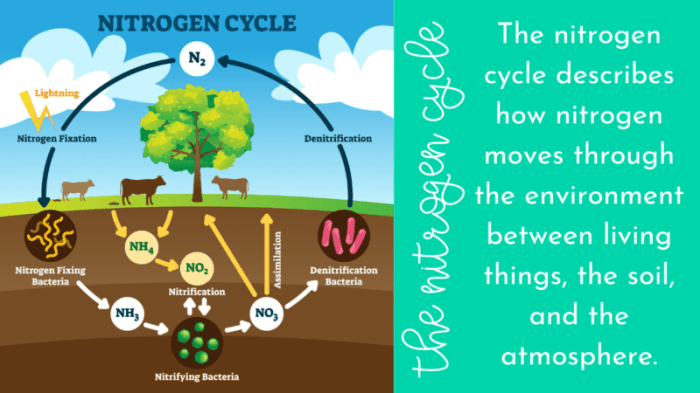The nitrogen cycle could not exist without . – The nitrogen cycle, a vital biogeochemical process, could not exist without the intricate interplay of specific organisms and processes. Its disruption would have profound consequences for ecosystems and global food production.
The cycle’s dependency highlights the significance of nitrogen-fixing organisms, nitrifying bacteria, denitrifying bacteria, plants, and animals, each playing a unique role in the transformation and availability of nitrogen.
The Nitrogen Cycle’s Dependency

The nitrogen cycle is a vital biogeochemical process that ensures the availability of nitrogen, an essential element for all living organisms. The cycle’s existence depends on the presence and function of specific organisms and processes. The absence or malfunction of these components would disrupt the cycle and have severe consequences for ecosystems and global food production.
Essential Roles within the Cycle
- Nitrogen-fixing bacteria:Convert atmospheric nitrogen into ammonia, making it available to other organisms.
- Nitrifying bacteria:Convert ammonia to nitrates, which plants can absorb.
- Denitrifying bacteria:Return nitrogen to the atmosphere through denitrification.
- Plants:Absorb nitrogen from the soil and utilize it for growth.
- Animals:Consume plants and release nitrogen through waste and decomposition.
Nitrogen Fixation: The Foundation
Nitrogen fixation is the process by which atmospheric nitrogen is converted into ammonia. This process is essential as nitrogen in its atmospheric form is unavailable to most organisms. Nitrogen-fixing bacteria, such as Rhizobium and Frankia, have the ability to convert nitrogen into ammonia through the enzyme nitrogenase.
Nitrogen-fixing bacteria can be free-living or symbiotic. Free-living bacteria, such as Azotobacter, fix nitrogen in the soil. Symbiotic bacteria, such as Rhizobium, form nodules on the roots of leguminous plants, providing them with nitrogen in exchange for carbohydrates.
Nitrification and Denitrification
Nitrification is the process by which ammonia is converted to nitrates. This process is carried out by nitrifying bacteria, such as Nitrosomonas and Nitrobacter. Nitrosomonas converts ammonia to nitrite, while Nitrobacter converts nitrite to nitrate.
Denitrification is the process by which nitrates are converted back to atmospheric nitrogen. This process is carried out by denitrifying bacteria, such as Pseudomonas and Bacillus. Denitrification occurs in anaerobic conditions, such as waterlogged soils or deep in the ocean.
The Role of Plants and Animals
Plants absorb nitrogen from the soil in the form of nitrates. Nitrogen is an essential macronutrient for plants, and it is used in the synthesis of proteins, nucleic acids, and chlorophyll.
Animals consume plants and release nitrogen through waste and decomposition. This nitrogen is then available to be taken up by plants and bacteria, completing the nitrogen cycle.
Human Impact on the Nitrogen Cycle
Human activities, such as fertilizer use and combustion, have significantly impacted the nitrogen cycle. Fertilizer use has increased the availability of nitrogen in the environment, leading to eutrophication of water bodies and increased greenhouse gas emissions.
Combustion processes, such as burning fossil fuels, release nitrogen oxides into the atmosphere. These nitrogen oxides can contribute to smog and acid rain.
Importance of Maintaining the Nitrogen Cycle, The nitrogen cycle could not exist without .
A disrupted nitrogen cycle can have severe consequences for ecosystems and global food production. A lack of nitrogen can limit plant growth, leading to reduced food production and ecosystem collapse.
Conversely, too much nitrogen can lead to eutrophication of water bodies, which can cause algal blooms, fish kills, and loss of biodiversity. It is crucial to preserve and manage the nitrogen cycle to ensure the sustainability of ecosystems and the future of global food production.
FAQ: The Nitrogen Cycle Could Not Exist Without .
What is the significance of nitrogen fixation in the nitrogen cycle?
Nitrogen fixation is the process by which atmospheric nitrogen is converted into forms usable by plants and other organisms. It is essential for making nitrogen available in the biosphere.
How do nitrifying bacteria contribute to the nitrogen cycle?
Nitrifying bacteria convert ammonia into nitrates, a form of nitrogen that can be utilized by plants. This process is crucial for the growth and productivity of plant communities.
What is the role of denitrifying bacteria in the nitrogen cycle?
Denitrifying bacteria return nitrogen to the atmosphere through the conversion of nitrates and nitrites into nitrogen gas. This process completes the nitrogen cycle and ensures the continuous availability of nitrogen.


